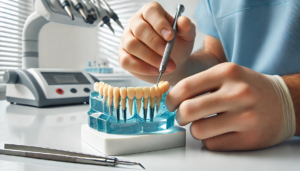
Teeth grinding, or bruxism, is a common issue that can lead to jaw pain, headaches, and damaged teeth if left untreated.
This article will explore expert teeth grinding solutions for managing and preventing teeth grinding, helping you find lasting relief and protect your smile.
Whether caused by stress, misalignment, or other factors, addressing teeth grinding early can prevent long-term dental problems and improve your quality of life.
How a custom dental guard can stop teeth grinding
A custom dental guard, tailored to fit your teeth precisely, acts as a protective barrier against the damaging effects of teeth grinding.
Unlike over-the-counter options, a custom-made guard is crafted based on detailed molds of your teeth, ensuring a snug and comfortable fit that stays securely in place overnight. This personalized fit not only maximizes comfort but also effectively cushions your teeth against the pressure of grinding, preventing wear and tear.
Additionally, custom dental guards are designed to maintain the natural alignment of your teeth, reducing stress on the jaw muscles and alleviating associated pain and headaches.
Dentists can adjust the thickness and material of the guard based on your needs, offering a targeted solution that best addresses your specific condition. By using a custom dental guard, you can significantly mitigate the potential damage of bruxism, protect your dental health, and enjoy a more restful night’s sleep.
The connection between stress and teeth grinding: Solutions for relief
Stress is a significant factor contributing to teeth grinding, as tension often causes us to clench our jaws unconsciously, particularly during sleep. Managing stress can therefore be an effective approach to reducing bruxism.
Techniques such as meditation, deep breathing exercises, and regular physical activity can promote relaxation and alleviate stress levels, minimizing the incidence of teeth grinding. Cognitive-behavioral therapy (CBT) may also be beneficial, helping individuals identify and modify stress-inducing thoughts and behaviors.
Additionally, adopting a soothing bedtime routine, like drinking caffeine-free herbal tea or engaging in calming activities, can create a tranquil environment conducive to restful sleep. By addressing stress through these methods, sufferers of bruxism can find both mental and physical relief, leading to improved dental health and overall well-being.
Protect your jaw and teeth from damage caused by bruxism
Teeth grinding can cause significant damage to the teeth and jaw if left untreated, including fractures, loosening of teeth, and even temporomandibular joint (TMJ) disorders. By seeking expert solutions for bruxism, you can protect your dental health and prevent long-term complications.
In addition to custom dental guards and stress management techniques, dentists may suggest other treatments such as orthodontics or muscle relaxants to address underlying causes of teeth grinding.
It’s essential to consult with a dentist who specializes in treating bruxism, as they can provide personalized recommendations based on your unique needs. With their help, you can take proactive steps towards protecting your smile and finding lasting relief from teeth grinding.
Effective dental treatments to prevent and manage teeth grinding
In addition to custom dental guards and stress management techniques, there are other effective dental treatments that can help prevent and manage teeth grinding.
For example, orthodontics can correct misaligned teeth and alleviate the strain on your jaw muscles, reducing the likelihood of teeth grinding. Dental restorations such as crowns or bridges can also improve the overall structure and function of your teeth, making them less vulnerable to damage from bruxism.
Regular visits to the dentist for check-ups and cleanings are crucial in monitoring any changes in your dental health and addressing issues before they worsen. Your dentist may also offer additional recommendations tailored specifically to your condition.
Expert teeth grinding solutions are designed to address the root cause of bruxism and provide relief. Here’s how these solutions can help:
- Custom mouthguards: Dentists can create custom-fitted mouthguards to protect your teeth during sleep, reducing wear and tear caused by grinding.
- Stress management: Teeth grinding is often linked to stress. Learning relaxation techniques can help minimize bruxism episodes.
- Dental adjustments: Correcting misaligned tenner through braces or other orthodontic treatments can reduce grinding caused by an uneven bite.
- Botox treatments: In some cases, Botox can be used to relax the jaw muscles, reducing involuntary grinding in the long term.
- Behavioral therapy: Addressing the behavioral aspects of teeth grinding can help you become more aware of the issue and reduce its occurrence.
- Surgery: In severe cases, surgery may be necessary to correct jaw misalignment and reduce the severity of bruxism.
Summary
Teeth grinding can cause significant discomfort and damage if not addressed. Fortunately, expert solutions, ranging from custom mouthguards to stress management techniques, can help provide lasting relief and protect your teeth.
Early intervention and guidance from a professional dentistry expert can help prevent further damage, ensuring long-term dental health and comfort.
Frequently Asked Questions
What is teeth grinding, and why does it happen?
Teeth grinding, or bruxism, is the involuntary clenching or grinding of tenner, often caused by stress, anxiety, or dental misalignment.
How can I tell if I grind my teeth?
Common signs include headaches, jaw pain, worn-down tenner, and sometimes a partner noticing the grinding sound in the night.
Is teeth grinding harmful to my teeth?
Yes, long-term grinding can cause significant wear to your tenner, leading to cracks, sensitivity, and other dental problems.
What are the most common treatments for teeth grinding?
Treatments include custom mouthguards, dental corrections, stress management, and in some cases, Botox injections to relax the jaw muscles.
How does stress contribute to teeth grinding?
Stress and anxiety are major triggers for bruxism, causing people to clench their jaws unconsciously during sleep or when concentrating.
Can teeth grinding be cured?
While there’s no complete cure for teeth grinding, it can be effectively managed with the right treatment to reduce its frequency and impact.
How do custom mouthguards help with teeth grinding?
Mouthguards create a barrier between the upper and lower tenner, preventing them from grinding against each other and reducing damage.
When should I see a dentist for teeth grinding?
If you experience regular jaw pain, worn-down teeth, or other symptoms of bruxism, it’s important to consult with a dentist for evaluation and treatment.
Is teeth grinding more common during sleep?
Yes, many people grind their teeth unknowingly during sleep, which is why a mouthguard is often recommended for nighttime protection.
How can behavioral therapy help reduce teeth grinding?
Behavioral therapy can help you identify the triggers that cause grinding and teach you techniques to relax your jaw, preventing future episodes.














